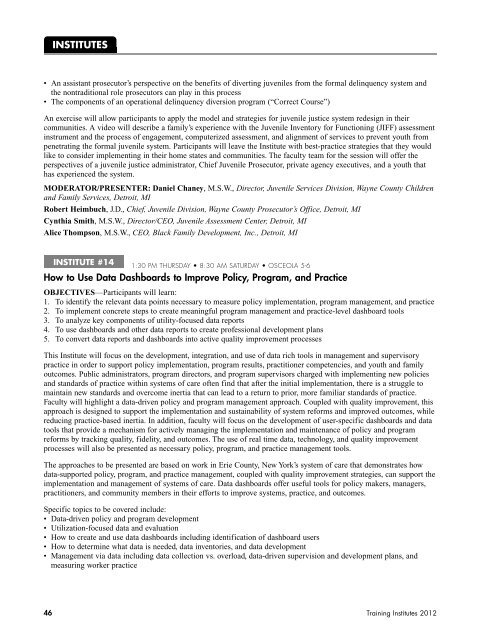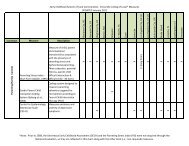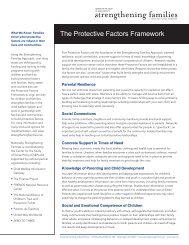Training Institutes 2012 - National Technical Assistance Center for ...
Training Institutes 2012 - National Technical Assistance Center for ...
Training Institutes 2012 - National Technical Assistance Center for ...
Create successful ePaper yourself
Turn your PDF publications into a flip-book with our unique Google optimized e-Paper software.
INSTITUTES<br />
• An assistant prosecutor’s perspective on the benefits of diverting juveniles from the <strong>for</strong>mal delinquency system and<br />
the nontraditional role prosecutors can play in this process<br />
• The components of an operational delinquency diversion program (“Correct Course”)<br />
An exercise will allow participants to apply the model and strategies <strong>for</strong> juvenile justice system redesign in their<br />
communities. A video will describe a family’s experience with the Juvenile Inventory <strong>for</strong> Functioning (JIFF) assessment<br />
instrument and the process of engagement, computerized assessment, and alignment of services to prevent youth from<br />
penetrating the <strong>for</strong>mal juvenile system. Participants will leave the Institute with best-practice strategies that they would<br />
like to consider implementing in their home states and communities. The faculty team <strong>for</strong> the session will offer the<br />
perspectives of a juvenile justice administrator, Chief Juvenile Prosecutor, private agency executives, and a youth that<br />
has experienced the system.<br />
MODERATOR/PRESENTER: Daniel Chaney, M.S.W., Director, Juvenile Services Division, Wayne County Children<br />
and Family Services, Detroit, MI<br />
Robert Heimbuch, J.D., Chief, Juvenile Division, Wayne County Prosecutor’s Office, Detroit, MI<br />
Cynthia Smith, M.S.W., Director/CEO, Juvenile Assessment <strong>Center</strong>, Detroit, MI<br />
Alice Thompson, M.S.W., CEO, Black Family Development, Inc., Detroit, MI<br />
INSTITUTE #14 1:30 PM THURSDAY • 8:30 AM SATURDAY • OSCEOLA 5-6<br />
How to Use Data Dashboards to Improve Policy, Program, and Practice<br />
OBJECTIVES—Participants will learn:<br />
1. To identify the relevant data points necessary to measure policy implementation, program management, and practice<br />
2. To implement concrete steps to create meaningful program management and practice-level dashboard tools<br />
3. To analyze key components of utility-focused data reports<br />
4. To use dashboards and other data reports to create professional development plans<br />
5. To convert data reports and dashboards into active quality improvement processes<br />
This Institute will focus on the development, integration, and use of data rich tools in management and supervisory<br />
practice in order to support policy implementation, program results, practitioner competencies, and youth and family<br />
outcomes. Public administrators, program directors, and program supervisors charged with implementing new policies<br />
and standards of practice within systems of care often find that after the initial implementation, there is a struggle to<br />
maintain new standards and overcome inertia that can lead to a return to prior, more familiar standards of practice.<br />
Faculty will highlight a data-driven policy and program management approach. Coupled with quality improvement, this<br />
approach is designed to support the implementation and sustainability of system re<strong>for</strong>ms and improved outcomes, while<br />
reducing practice-based inertia. In addition, faculty will focus on the development of user-specific dashboards and data<br />
tools that provide a mechanism <strong>for</strong> actively managing the implementation and maintenance of policy and program<br />
re<strong>for</strong>ms by tracking quality, fidelity, and outcomes. The use of real time data, technology, and quality improvement<br />
processes will also be presented as necessary policy, program, and practice management tools.<br />
The approaches to be presented are based on work in Erie County, New York’s system of care that demonstrates how<br />
data-supported policy, program, and practice management, coupled with quality improvement strategies, can support the<br />
implementation and management of systems of care. Data dashboards offer useful tools <strong>for</strong> policy makers, managers,<br />
practitioners, and community members in their ef<strong>for</strong>ts to improve systems, practice, and outcomes.<br />
Specific topics to be covered include:<br />
• Data-driven policy and program development<br />
• Utilization-focused data and evaluation<br />
• How to create and use data dashboards including identification of dashboard users<br />
• How to determine what data is needed, data inventories, and data development<br />
• Management via data including data collection vs. overload, data-driven supervision and development plans, and<br />
measuring worker practice<br />
46 <strong>Training</strong> <strong>Institutes</strong> <strong>2012</strong>













